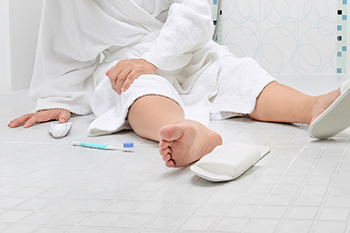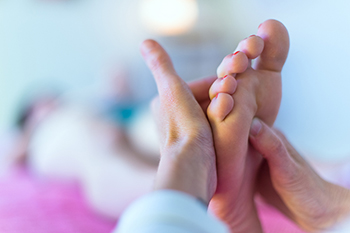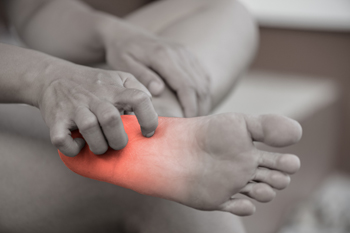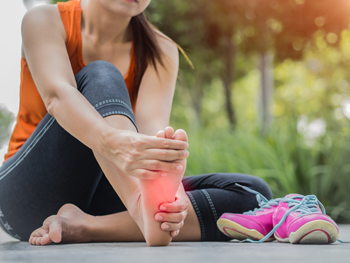
Falls prevention is particularly important for the elderly population, who are more apt to suffer from fall-related injuries. Performing regular stretching and strengthening exercises are methods that can help to maintain balance. Ensuring loose carpets are adhered to the floor, halls are cleared of obstacles, and floors are dry, can help to avoiding falling at home. It is beneficial for medications to be checked for side effects that may cause dizziness or fatigue. Having eyesight regularly checked and updating prescription eyeglasses will keep vision issues under control. Routinely going to the doctor for examinations can help with staying ahead of current or emerging health conditions, which may possibly lead to falling. For example, if blood pressure is low or arthritic joints are inflamed, falls are more likely to occur. If you have had previous falls, and sustained an injury to your feet or ankles, it is suggested that you visit a podiatrist who can help you in all of these areas, and guide you toward effective fall prevention techniques.
Preventing falls among the elderly is very important. If you are older and have fallen or fear that you are prone to falling, consult with Dr. Richard DiMario from Maine. Our doctor will assess your condition and provide you with quality advice and care.
Every 11 seconds, an elderly American is being treated in an emergency room for a fall related injury. Falls are the leading cause of head and hip injuries for those 65 and older. Due to decreases in strength, balance, senses, and lack of awareness, elderly persons are very susceptible to falling. Thankfully, there are a number of things older persons can do to prevent falls.
How to Prevent Falls
Some effective methods that older persons can do to prevent falls include:
Falling can be a traumatic and embarrassing experience for elderly persons; this can make them less willing to leave the house, and less willing to talk to someone about their fears of falling. Doing such things, however, will increase the likelihood of tripping or losing one’s balance. Knowing the causes of falling and how to prevent them is the best way to mitigate the risk of serious injury.
If you have any questions, please feel free to contact our office located in York, ME . We offer the newest diagnostic and treatment technologies for all your foot care needs.

Having a foot massage performed may be an effective method of reducing stress. Research has shown there is a difference between foot massage and foot massage therapy. People who get foot massages are aware of the good feeling they can bring, whereas foot therapy targets the pain points that are triggered, and the correct amount of pressure is applied to them. This may be helpful in keeping the feet strong, as they carry the weight of the body. Wearing shoes that do not fit correctly may result in overstraining the foot muscles, and this can be addressed during foot massage therapy. It can be easier to relax when this is performed, and an added benefit may be better blood circulation, lowered blood pressure and sleep quality may be improved. Patients have found existing foot wounds have healed faster, and the immune system may be enhanced. If you have questions about foot massage therapy, it is suggested that you consult with a podiatrist who can provide a detailed explanation.
Foot therapy is often necessary for those recovering from either foot deformities or foot injuries. If you have concerns regarding therapy, consult with Dr. Richard DiMario from Maine. Our doctor can provide the care you need to keep you pain-free and on your feet.
Most Common Injuries
People who are active or athletes are prone to a variety of injuries. Therefore, it is often important to take part in physical therapy in order to quickly get back on the right track.
What to Do When Injured
Physical Therapy – This specialized treatment will focus on the affected area, speeding up recovery and the overall healing process. It is a proven method that has helped millions of people return from any injury.
During physical therapy you will undergo regimented training to get back into full form. Training is often very difficult, especially at first when the foot feels weak. Physical therapy often involves:
Basic stretching and twisting exercises – getting the feet’s mobility and flexibility up.
Massaging – the therapist will massage the injured area in order to activate the muscles and relax them.
Strengthening Exercises – this allows the muscles in the affected area to regain their full strength, a vital step towards full recovery.
If you have any questions please feel free to contact our office located in York, ME . We offer the newest diagnostic tools and technology to treat your foot and ankle needs.

Neuropathy is nerve damage. It is a common condition among diabetic patients, which can happen as a result of elevated glucose levels in the blood. Recent studies have shown that about 60 percent of neuropathy cases in the United States are linked to diabetes. The feet are often affected, and the inability to feel existing cuts and scrapes may lead to developing a foot ulcer. The symptoms that often accompany this condition can include a numbing or tingling sensation, and the muscles can feel weak. Developing neuropathy may also be connected to chronic alcoholism, HIV, or AIDS, and there are cancer patients that may have this condition. A deficiency of vitamins B12 or A may cause neuropathy to occur, in addition to eating foods that have toxins. A diagnosis is generally needed to confirm this condition, which consists of having a blood test taken or possibly a skin biopsy performed. If you have numbness in your feet, it is suggested that you contact a podiatrist as quickly as possible who can properly diagnose and treat neuropathy.
Neuropathy
Neuropathy can be a potentially serious condition, especially if it is left undiagnosed. If you have any concerns that you may be experiencing nerve loss in your feet, consult with Dr. Richard DiMario from Maine. Our doctor will assess your condition and provide you with quality foot and ankle treatment for neuropathy.
What Is Neuropathy?
Neuropathy is a condition that leads to damage to the nerves in the body. Peripheral neuropathy, or neuropathy that affects your peripheral nervous system, usually occurs in the feet. Neuropathy can be triggered by a number of different causes. Such causes include diabetes, infections, cancers, disorders, and toxic substances.
Symptoms of Neuropathy Include:
Those with diabetes are at serious risk due to being unable to feel an ulcer on their feet. Diabetics usually also suffer from poor blood circulation. This can lead to the wound not healing, infections occurring, and the limb may have to be amputated.
Treatment
To treat neuropathy in the foot, podiatrists will first diagnose the cause of the neuropathy. Figuring out the underlying cause of the neuropathy will allow the podiatrist to prescribe the best treatment, whether it be caused by diabetes, toxic substance exposure, infection, etc. If the nerve has not died, then it’s possible that sensation may be able to return to the foot.
Pain medication may be issued for pain. Electrical nerve stimulation can be used to stimulate nerves. If the neuropathy is caused from pressure on the nerves, then surgery may be necessary.
If you have any questions, please feel free to contact our office located in York, ME . We offer the newest diagnostic and treatment technologies for all your foot care needs.

Running is a popular way to exercise, but if care is not taken, it can cause several injuries to the feet and ankles. Most common among them are plantar fasciitis, ankle sprains, stress fractures, and Achilles tendon tears. Experts recommend these procedures to help prevent injuries from running. First, warm up before you start by walking or light jogging and then performing stretches, such as lunges and knee raises. Next, be certain you have the proper footwear, both for your feet and for the type of running you are doing. A properly fitting shoe, with ample cushioning and arch support, is essential to warding off injury. Be sure to increase the time, distance, and intensity of your runs gradually. A rule of thumb is not to increase distance or intensity by more than 10 percent per week. If you begin to feel pain when running, it is wise to pay attention to it. Running through the pain can make the injury worse. Finally, stretch and give your feet and ankles a chance to rest after running. If you sustain a running injury that persists or worsens, it is suggested that you make an appointment with a podiatrist.
Exercising your feet regularly with the proper foot wear is a great way to prevent injuries. If you have any concerns about your feet, contact Dr. Richard DiMario of Maine. Our doctor will treat your foot and ankle needs.
How to Prevent Running Injuries
Many common running injuries are caused by overuse and overtraining. When the back of the kneecap starts wearing out and starts causing pain in your knee, this is commonly referred to as runner’s knee. Runner’s knee is a decrease in strength in your quadriceps and can occur if you’re not wearing properly fitted or supporting shoes. To prevent runner’s knee, focusing on hip strengthening is a good idea, as well as strengthening your quads to keep the kneecaps aligned.
What Are Some Causes of Running Injuries?
- One cause of a common running injury is called iliotibial band syndrome.
- Plantar fasciitis is also another common injury.
- Stress fractures can occur from overtraining, lack of calcium, or even your running style.
Best Ways to Prevent Running Injuries
- Wear footwear that fits properly and suits your running needs.
- Running shoes are the only protective gear that runners have to safeguard them from injury.
- Make a training schedule. Adding strengthening exercises as well as regular stretching can help keep you strong and limber and can lessen the possibility of injuries.
- Stretching keeps muscles limber; this will help you gain better flexibility.
If you have any questions please feel free to contact our office located in York, ME . We offer the newest diagnostic and treatment technologies for all your foot and ankle needs.